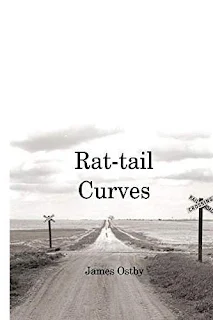https://www.amazon.com/Rat-Tail-Curves-James-Ostby-ebook/dp/B072WR92QQ
When you come to northeastern Montana, you come to nowhere, and there's nothing. Nothing but sky, space, open prairie, wheat fields, and isolation. Deserted homesteads and small, dying towns. Sun, wind, rain, and snow. Solitude. And memories. Time to think. Too much time. It's been quite a journey. We all take different paths: winding, convoluted, tortuous, . . . , often regressive. Some of us are cut short of our goals early in life, some of us are blessed with more time and higher intellectual plateaus. And some of us pause to look back with more skepticism in order to catch more realistic glimpses of our final destination. Many are sure of their destination, some of us are not.
This book is about physical, philosophical, spiritual, and human limits, and the frustrations that arise when those limits are met. We mortals are at a juncture like no other. When I began this project many years ago, I read extensively; mostly philosophy and science; some religion. (I tend to lump religion and philosophy together, but that may be a concession to religion.) Something happened: the ideas got repetitious. And, after all of my reading--at some mental saturation point--it was obvious that no writer, especially any philosopher, had promulgated much in the way of real, substantive content. Lots of baloney but no sandwich. No new philosophers; no new philosophies. Everything worth thinking had been postulated hundreds of years B.C.E. and subsequently subjugated by religion, which subjugation is in turn being superseded by science and a new awareness of reality in the more enlightened areas of our small domain. I came close to throwing out most of the books I had read and I admit to skipping thorough parts of some, but at the last moment--about halfway through the completion of this endeavor--I reconsidered. There are still some pearls of wisdom.
Nihilism (from the Latin nihil, nothing) is the philosophical position that values do not exist, but rather are falsely invented. Most commonly, nihilism is presented in the form of existential nihilism which argues that life is without meaning, purpose, or intrinsic value. Moral nihilists assert that morality does not exist, and subsequently there are no moral values with which to uphold a rule or to logically prefer one action over another. Nihilism can also take epistemological, metaphysical, or mereological forms. But this book is not about nihilism of any kind (existential, moral, . . . , because I'm not saying there can't be meaning; only that there is an ultimate end to knowledge. Even in epistemological nihilism there can be purpose in life. (And I'm not denying all knowledge.)
I have tried to emphasize the self-evident. It's surprising how seldom that is done.

